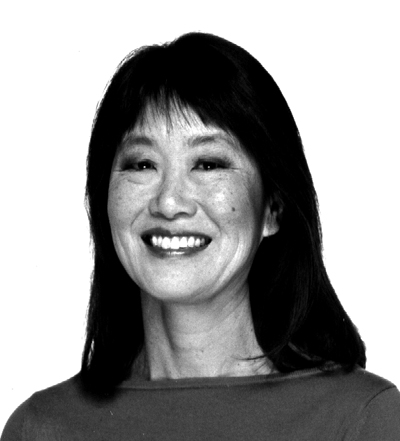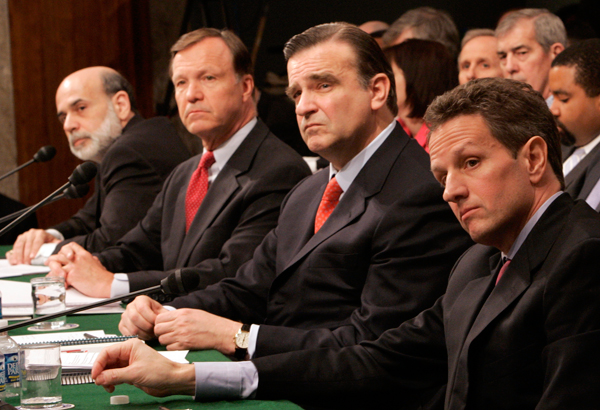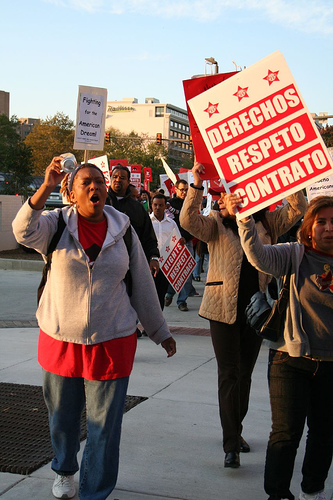Women and the Economy
Women and the Economy
Meizhu Lui Asks, Who’s Bailing Out Whom?
During the October, 2008, U.S. financial crisis and government bailout, television and radio reporting showcased a parade of male commentators affiliated with Wall Street, the country's financial hub. A sampling of soundbites from these pundits would lead anyone to believe that only such "experts' could make sense of these massively complex economic transactions.
But activist Meizhu Lui has been debunking myths and demystifying economic concepts--all while organizing women to act--for more than 30 years. I.M.O.W. sat down with Ms. Lui shortly after the October bailout to discuss how, over the years, women have been impacted and have taken action to curb the continual crises created on trading floors and in boardrooms they've seldom had access to.



Lui's sense of injustice was piqued when her manager told her, "Oh, you Chinese are good workers, aren't you?" Offended by the remark, she kept quiet because "I really needed a job. I was desperate." However, she quickly learned that "the only people who could make doughnuts were men, and the women were only allowed to serve the doughnuts," relegating them to lower wages and less respect on the job.
One day, when the cash tally didn't add up, Lui's manager, without proof, accused her of stealing from the register and docked her pay. She found out about a labor law that made it illegal to take pay away if the manager also had access to the cash register.
Lui went to the labor board, sued and got her money back. She lost her job, but felt good about teaching her boss a lesson: "[He thought that] women would just take anything, particularly an Asian woman. He was not expecting me to fight back."
This experience fueled Lui's desire "to be part of a movement where people get together to make life easier for the next generation of workers, particularly women workers."
Lui ended up working in food service departments in various Boston hospitals, befriending and eventually organizing her co-workers--mostly working-class women of color--into some of the city's most formidable unions.
She remembers, "I had grown up believing that we have...the right to free speech, the right to organize and so on. But... those rights stop at the door of the business. We weren't allowed to talk about the union....I was surprised at how much fear there was [but] I had a great job, because as the cashier in the cafeteria, I could hand out union literature!"
For Lui, her relationships and solidarity with co-workers were very important. She notes that union leadership has changed a lot over the last 30 years. Now, women of color, many of them immigrants, head up unions in garment factories, farms and food service industries. Female leadership styles are different too, not rising from but with the masses.
Reflecting on the 2008 economic crisis and financial bailout, Lui points out, "First of all, the crisis, at the bottom, has been going on for quite a while. It wasn't really named as a big crisis until it just started to hit the pocketbooks of wealthy investors. Job loss has been going on for a number of years. Real income has not increased for a long time, so people have been living on less and therefore borrowing more....People have no cushion."
Lui explains that the hardest hit are women, working class communities, racial minorities and immigrants--often overlapping groups of people. She adds, "The dirty little secret of our economy is that it has been built on the debt of ordinary folks."
Now, Lui is using her 30-plus years of experience as a worker, union leader and most recently researcher, to challenge the authority of so-called experts and give voice to the concerns of the average American: "The economy is not this sort of giant machine. It's really about the day-to-day living of ordinary people, and what they face as they try to go to the grocery store, try to get a job, try to get a paycheck, and take care of their kids."
Thanks to several decades of trickle-down policies that have yet to trickle down, those challenges are greater than ever before, but Meizhu Lui is one of many women trying to make a difference.

